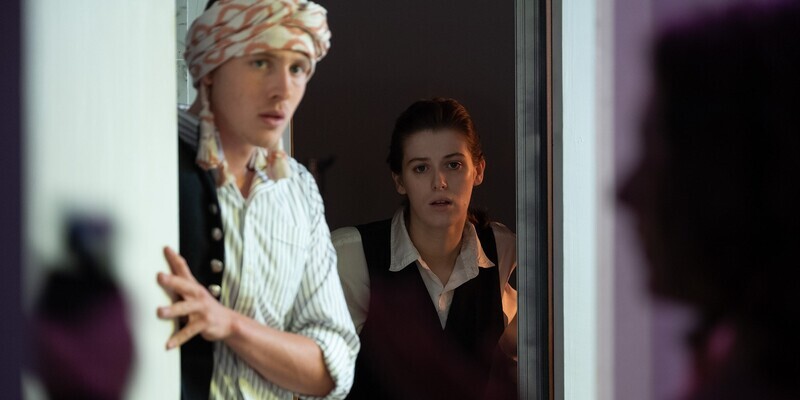
Review by
Eric Hillis
Directed by: Joanna Hogg
Starring: Honor Swinton Byrne, Tilda Swinton Jaygann Ayeh, Richard Ayoade, James
Spencer Ashworth, Harris Dickinson, Charlie Heaton, Joe Alwyn, Ariane
Labed

There are some people who feel that artists serve no real function. You
know, the type that visit a gallery to pronounce "my kid could paint
that!" But even the greatest philistines among us tend to rely on
artists and creators when it comes time to say goodbye to a loved one.
At memorial services, poems are read by people who might otherwise
mistake Wordsworth for a supermarket chain. When it comes time to bid
farewell and send someone off to the next world, we invariably seek the
help of those more artistically blessed than ourselves.
How does an artist memorialise a dead loved one, and what if their art
is a collaborative one like film that forces them to reveal their
feelings to a bunch of agitated crew members who just want to get
finished by five o'clock? That's the task faced by Julie (Honor Swinton Byrne) in the unlikely but welcome sequel to Joanna Hogg's
semi-autobiographical
The Souvenir.

The first film told the story of Julie, a film student from a wealthy
background who falls for Anthony (Tom Burke), an enigmatic
chancer who claims to work for the foreign office, but who is really a
spoofer sponging off Julie and God knows how many others to feed his
heroin addiction. That film ended with Anthony fatally succumbing to his
habit, and the sequel picks up soon after.
Unable to discuss her loss in any real depth with either her own or
Anthony's parents, Julie decides to work through her feelings by
dramatising her relationship with Anthony through her graduation film.
Her idea provokes scorn from her lecturers, who preferred her previous
pitch of a patronising look at poverty in the city of Sunderland. They
ask Julie how she intends to shoot a script that doesn't conform to
industry standards, but Julie can't give them an answer. On set she
pisses off her fellow students with her inability to communicate her
ideas. She casts a French student, Garance (Ariane Labed), as her
own surrogate, but Garance can't wrap her head around the character
because she doesn't understand the very British mentality of avoiding
confrontation and sweeping relationship problems under the carpet.
Over the course of her two films, Hogg examines the Briton's inability
to express emotions, and why for this reason they need art more than
most people. The closest Julie comes to opening up about her feelings
comes when she has a couple of pints in her system on an afternoon in
the pub. She's seeing a therapist, but a few pints with a willing
listener proves more healing. Being Irish, I come from a culture that
shares this trait with the Brits, but I rarely see it expressed in
British cinema. I usually have to look to the cinema of Japan and Korea
to see my culture's emotional repression on the screen.

This repression extends beyond Julie. In an emotionally devastating yet
beautifully underplayed scene, Julie accidentally breaks a replica
Etruscan vase her mother (Tilda Swinton) has spent three months
making as part of a ceramics course. Her mom insists all is well, but
Swinton senior plays it in a way that tells us she's dying inside. When
we're Julie's age, we too often fail to see our parents as having lives
and interests beyond simply being our parents. Julie can't grasp what
the vase meant to her mother, an expression of artistry as valid as the
film she herself is attempting to make. Or perhaps it wasn't an accident
and Julie is jealous that her mother could make her artistic vision
whole in a way she's struggling to. Or maybe she just wanted someone
else to feel a little hurt.
Julie's journey sees her attempt to fill the void left by Anthony by
hooking up with a manipulative actor and striking out in asking a fellow
student back to her place, only to learn he's gay. One of the great
things about Hogg's two films is how brutally honest she is about
Julie's self-centred ways. After her gay classmate lends an ear to her
problems, he mentions that his boyfriend hasn't been well. Given the
time period, it's clear what he's getting at, but Julie is too
self-consumed to return the favour and lend her own ear. Hogg never
hides Julie's privilege (she gets to realise her artistic vision with
the help of a £10,000 loan from Mommy), but she never pretends that said
privilege can ever dull Julie's pain. You can't write a cheque for
grief.
In Richard Ayoade's Patrick, an egotistical filmmaker struggling
to realise his vision of an Absolute Beginners style
musical, we get a glimpse of the artist Julie might become. Questioned
by an interviewer, Patrick argues the case for the musical as a
necessary form of escapism. Hogg seems to concur, as she closes her film
with a Minnelli-esque fantasy sequence like those that end
The Band Wagon and An American in Paris. In a way, The Souvenir: Part II is Hogg's
Two Weeks in Another Town, a postmodern companion piece to her own
The Bad and the Beautiful.

The Souvenir films might boast one of the most quietly
fascinating protagonists of recent British cinema, but they're also
packed with supporting characters so vividly realised that you may find
yourself longing for a set of spinoff movies, a
Souvenir cinematic universe. Despite her limited screen
time, Julie's mom is one of the all-time great screen mothers. Every
time she's onscreen she's consoling her daughter, but we're always
thinking about what she might be going through in her own life. Julie's
father (James Spencer Ashworth) is one of those great laid back
dads who supports his little girl in any venture she undertakes, even if
he can't get his head around it. Like most men, he's oblivious to what
the women in his life are going through, which leads to some lovely
comic moments.
A final scene suggests that Hogg has closed the book on this particular
world, but she's left us with two beautiful souvenirs to display on our
blu-ray shelves.


